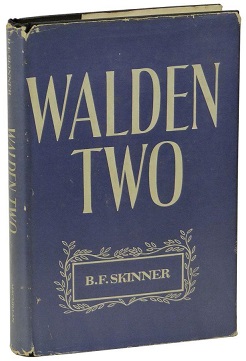"Walden Two" is a bizarre utopian novel by
the notorious behaviourist B.F. Skinner. The novel (first published in 1948) is
quite seriously intended, but nevertheless comes across as an unintentional
parody of social engineering. Had it been a work of considerable antiquity, I'm
sure Leo Strauss and Alan Bloom would have assumed that it *is* a parody!
As classical utopian novels, "Walden Two" has no real plot. Most of the "novel" is a description of an imaginary utopian community, named Walden Two after the forest where Thoreau wrote his famous work "Walden". The similarity between Thoreau and Skinner isn't very striking, however. Walden Two may be surrounded by farmland, but it's really a large public housing complex with about 1,000 inhabitants, and obviously based on high technology. It has plans to expand and eventually take over all of the United States. Thoreau, as far as I know, mostly wanted to be left alone!
The main character of the story is Frazier, the founder of Walden Two, who guides six visitors (and the reader) through the community and explains its ideology. Another character is named Burris. Apparently this is supposed to be B.F. Skinner himself, although Frazier is probably Skinner's real alter ego. Yet another character is an unsympathetic, useless and abstract philosophy professor named Castle, who is Frazier's main protagonist and constantly questions both him and the utopian society. The four remaining characters are named Roger, Barbara, Mary and Steve.
Walden Two turns out to be a benevolent dictatorship ruled by anonymous Planners and Managers. They are not elected but appoint their own successors. The law of the community is called the Code and can be changed only be the Planners and Managers. The members of the community are not allowed to discuss any changes of the Code amongst themselves. The meaning of the Code is explained at mass meetings. There are also a kind of Sunday sermons. Children are taken from their parents immediately at birth and given a collective upbringing and education, based on (bizarre) behavioural psychology and conditioning. There is no sense of history. In fact, study of history is discouraged. Not even Frazier, who founded the community, expects to be remembered. At death, people are cremated and quietly forgotten. The important thing is the collective and the plan. Everyone in Walden Two seems to live in an eternal now.
All problems are solved by behavioural engineering. If anyone has problems with the Code, he is considered to be sick and sent to a psychologist. A group of medical doctors have complete control of nutrition, physical training and sanitation. Even the tea service is managed according to scientific principles! Despite these authoritarian features, everyone in Walden Two is happy and contended. They only work four hours per day, and spend the rest of their time playing music, watching theatre or tending the gardens.
And that, of course, is the point.
What struck me when reading "Walden Two" was Skinner's unabashed elitism. He has a kind of benevolent contempt for the common man. Anti-democratic arguments abound. Society must be rationally planned by a scientific elite steeped in behaviourism. Elections are unnecessary and "freedom" is just an illusion. The important thing is to make the common people feel happy. Of course, people have no idea how to accomplish this, and the task should therefore be left to experts. But since people will be happy-happy-happy, what grounds are there for complaints? Two of the characters, Mary and Steve, join the community almost immediately. They are real simpletons and sign up because Walden Two has a high standard of living and provides them with simple pleasures. In other words, Mary and Steve (just listen to those common names!) are symbols of the plain folk Skinner both despised and wanted to "help" with his social engineering. By contrast, the intellectual Castle turns out to be quite impossible.
Frazier openly talks about how Walden Two will eventually take over the neighbouring towns, buy up the farmers' land and force the local dealers to join "the cooperative"...or else, apparently. Frazier also reveals that all of Walden Two's inhabitants vote for the same candidates in the local elections. Both methods (economic compulsion and bloc vote) were used by Mormons to wield political power in both Nauvoo and Utah during the 19th century. Indeed, Skinner might have gotten the idea from a study of Mormon history (he mentions Joseph Smith in passing). At an even more candid moment, Frazier climbs onto a spot known as the Throne, assumes a position similar to the crucifixion, and fancies himself an equal to God and Jesus Christ! As for the inevitable parallels with Soviet Russia, Skinner's alter ego brushes them aside by accusing the Russians of not being radical enough. After all, they never abolished the family or religion.
"Walden Two" is a fascinating, bizarre and interesting example of the darker sides of social engineering. As already mentioned, it could be read as an unintentional parody. One recurring scene in the novel is a flock of sheep seemingly conditioned to stay within a moving enclosure, but actually carefully watched by a large sheepdog. The symbolism is ambiguous. I suppose it's intended as a symbol of how people behave when *not* converted to Skinner's program. However, it may just as well be seen as a symbol of Walden Two. Indeed, Castle sees it that way.
Somehow, it feels as if he has the last word.

No comments:
Post a Comment